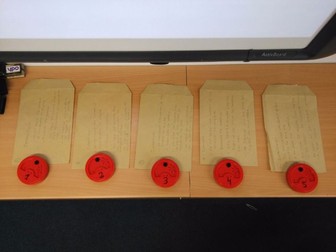5 tenses revision tool in Spanish with guided learning (translation exercise new GCSE spec)
great revision tool. I use an infinitive random selector between tasks. (AFL MWB before moving on to next tense)<br />
Each student is given a tense written en MWB face down at the begining of the lesson (they will be responsible for the tense for the 2 first tasks)<br />
You might want to give them a chance to discuss their answer before showing answers (task one / talk for learning)<br />
<br />
progression from identifying tenses to applying in context (translation)<br />
Final exercise is a speaking task. Ideally students would be given time to use skills aquired in translation exercise to prepare the speaking before being given opportunities to answer the questions.<br />
This is a lesson designed for a double period<br />
<br />
join my page on https://www.facebook.com/groups/214435352303703/?fref=ts
